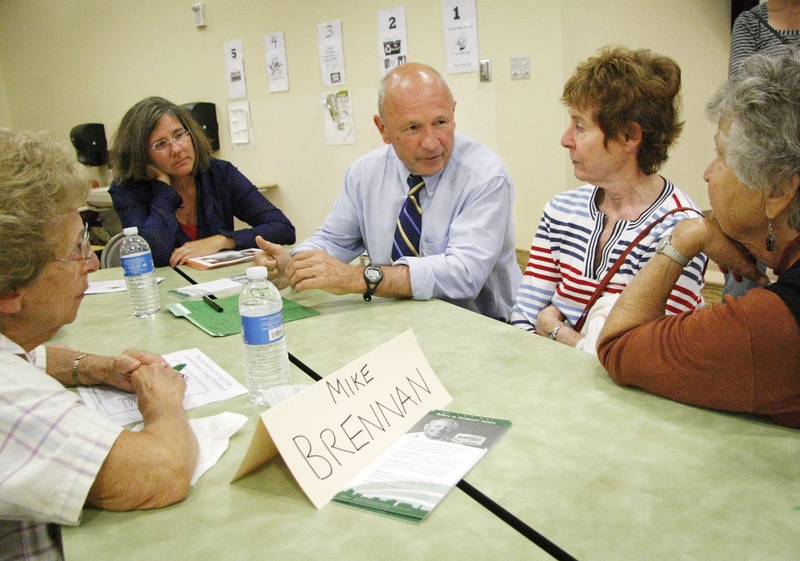Portland Mayor-elect Michael Brennan outlined his priorities in a post-election interview with The Portland Press Herald last week and they are good ones: jobs and education.
The two go together, of course. As Gov. Paul LePage and many experts have pointed out, jobs exist but they require a trained work force. And businesses interested in bringing new jobs to Maine demand well-educated workers with specific skills.
If Portland is to compete for economic development in the national and global marketplaces, the city must provide its future job-seekers with a quality education and market-specific skills.
As a former state senator who retains close ties with Augusta, Brennan is well-positioned to address these issues. He helped rework the school funding formula to Portland’s benefit when he served in the Legislature, so he knows the ins and outs of State House maneuvering when it comes to seeking help for Portland’s schools.
“The scariest thing I heard on the campaign trail was young families saying they might move out of Portland because they lacked confidence in the school system,” Brennan told Staff Writer Jason Singer. “That’s bad for Portland’s future.”
Brennan, who will be Portland’s first elected mayor in nearly a century when he takes office next month, said he plans to participate in the search for a successor to outgoing school Superintendent Jim Morse. Filling that position is an urgent priority because Morse was an outstanding leader for the school system who effectively addressed some long-standing problems and set the stage for dramatic improvement in the future.
City and school officials as well as taxpayers will expect his replacement to be someone capable of continuing and building upon the momentum Morse established.
Brennan said he intends to focus on small business as the key to economic development – another encouraging reflection of the experience and insight that propelled him to victory in a mayoral campaign that featured a crowded field of 15 candidates and the city’s first-ever use of “ranked-choice” voting.
“Maine is a small-business state and Portland is a small-business city,” he told Singer. “We need to allow the small-business owners that are currently in Portland to thrive and expand.”
We agree. As the state of Maine, its communities and in fact the entire nation struggle to recover from the worst recession of our time, the success of small business is crucial to stimulating the economy and reducing unemployment. Officials at every level of government know it and constantly beat the drum for small business, pushing for rollbacks of job-killing regulations and burdensome taxation. Even politicians who disagree on almost everything else agree that small businesses must be given a leg up in this challenging economy.
Brennan said he plans to start by embracing the city’s new economic development plan, which calls for a “visitation program to obtain regular feedback from the business community, with areas of concern addressed in a timely manner.”
Brennan’s willingness to seek ideas and feedback from local businesses and involve them in decisions that affect their success or failure is representative of the sort of outreach we expect from him as he undertakes the unique task of defining and refining the role of mayor in its new incarnation as a full-time position.
And we have an additional suggestion for him along those lines.
The field of 15 candidates for mayor was unwieldy and at first glance might have seemed hopelessly superfluous. In many elections for public office, voters can consider themselves fortunate if presented with two or three qualified candidates, much less 15. It’s unfortunate but true: A large field of office-seekers too often is cluttered with individuals who bring little to the campaign but their egos and a list of pet peeves.
Portland’s mayoral race, however, was contested by an impressive array of serious candidates offering interesting and meaningful ideas for making Portland a better place to live and work. MaineToday Media’s editorial board met with all 15 hopefuls in a series of free-flowing discussions, and even those who were certain to be eclipsed by better known candidates and better financed campaigns held their own in the exchange of proposals and suggestions for dealing with the city’s problems.
That so many individuals had so much to contribute spoke not only to the high quality of debate in this historic campaign for mayor but also to the breadth and depth of Portland residents’ commitment to the future of their city.
Now that Michael Brennan’s vision for the city has prevailed over all the others, we urge him to reach out to his former opponents and the citizens who supported them.
Some of the excellent ideas we heard during the campaign should find a home in the mayor’s office, even if the candidates who proposed them didn’t.
Send questions/comments to the editors.



Success. Please wait for the page to reload. If the page does not reload within 5 seconds, please refresh the page.
Enter your email and password to access comments.
Hi, to comment on stories you must . This profile is in addition to your subscription and website login.
Already have a commenting profile? .
Invalid username/password.
Please check your email to confirm and complete your registration.
Only subscribers are eligible to post comments. Please subscribe or login first for digital access. Here’s why.
Use the form below to reset your password. When you've submitted your account email, we will send an email with a reset code.